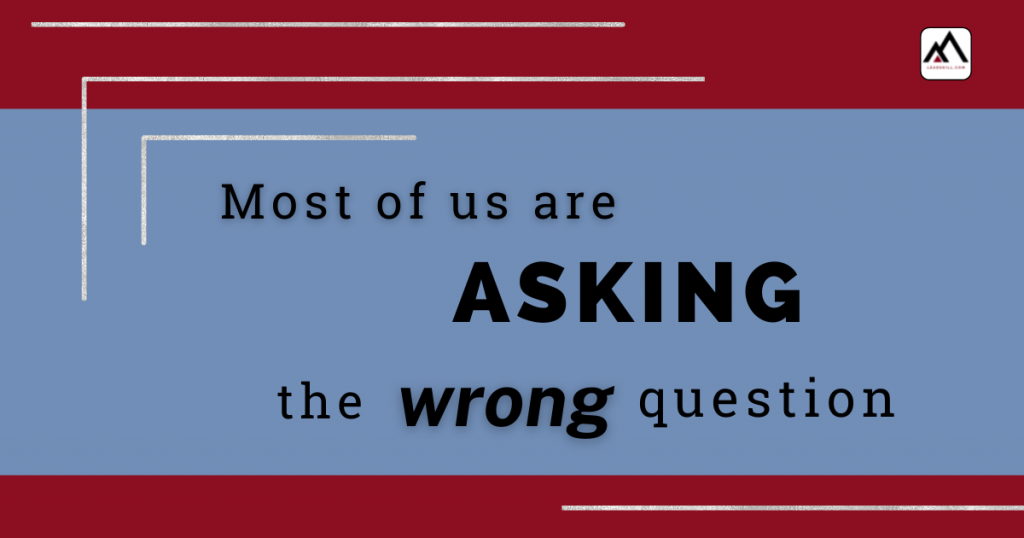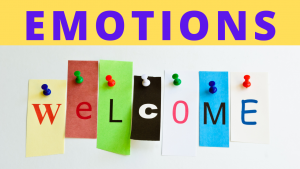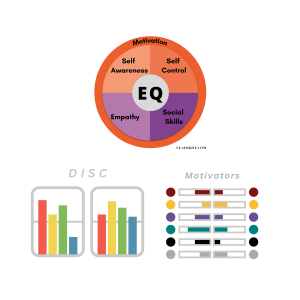Self awareness is socially desirable, and the majority of leaders think they are pretty self aware. Of course, they are wrong. The majority of leaders cannot have above average self awareness – it is a statistical impossibility.
So why do we fall into the trap of thinking we are exceptional? I’ll explain this and point you to a few ways to better understand self awareness in a minute. I’ve coached a few thousand leaders over my career and researched personal development in depth, and I’m going to share with you the key thing to know about self awareness.

We All Start Out Lacking Self Awareness
When we are young children we think the world revolves around us. We have little to no self-awareness. As we grow older it’s natural to gain some awareness that other people are different from me. People who are successful and take on leadership positions often think they have pretty good self-awareness.
I’m no different. I’ve taken psychometric tests and had consultants collect feedback from people I work with who know me well. I like to think I’m fairly self-aware. But a few people that I respect have told me I’m no more self-aware than a rock. Ouch!
The Reason You and I Aren't as Self-Aware as We Think
Self-aware people seem to have more confidence, they communicate better, and they often show greater creativity. The problem is most leaders only look one place to see if they are self-aware: themselves!
Psychologists have shown that leaders often have a tendency to confirm their own biases and overrate their abilities. We lack the objective input of others, of people who know us well enough to say whether or not we demonstrate good self-awareness. Research has shown that only 15% of leaders are as self-aware as they think they are.
What's Needed?
There are three things we need more of:
- A little more humility
- Input from others who know us well
- An attitude of curiosity as we try to understand ourselves better
I have done more self-development work over the years, and I’m learning about my blind spots. Socrates was wise because he knew the limits of his knowledge and he kept asking questions. It seems to me leaders with good self-awareness do the same thing.
The Right Question to Grow Self-Awareness
Leaders who are self aware are simply more effective and influential. We want to follow people who are confident and thoughtful, not arrogant and clueless. Someone who is dogmatic and narcissistic may get their way, but they repel independent-minded talent, which is exactly who small and growing organizations most need.
You want to develop self awareness. It’s not something nice to have, it’s an essential. To do that you need to ask the right questions like Socrates showed us. The issue is most of us are asking the wrong question.

Why Am I That Way?
The way we try to gain self awareness is usually by reflecting on what we’ve done. We ask some version of the question, “Why did I do that?” That kind of introspection is time-honored. It’s also often counter-productive.
The mind is tricky. When you ask yourself a question, you usually come up with an answer. It may not be the right answer, but we don’t often question it. Research shows that we often don’t question deep enough to get to underlying causes. We also settle for reasons that seem logical enough to us even if they aren’t accurate.
If you want to develop better self-awareness, you need to stop asking questions that start with “Why?” The mind will come up with answers, and most of them don’t lead to real self-awareness.
The Right Question to Ask
If “why?” is the wrong question, what is the right question? Change your first word to “what” or “how”. The goal is to really understand yourself better, so you need more objectivity. Think like a scientist and ask questions about things you can observe (“what”) or about the process or sequence of events (“how”).
Don’t just ask yourself these questions. Ask others as well. “What did you hear me say to the customer?” “Honestly, how did you see me handle that situation?” Self-awareness grows when we can see ourselves through the eyes and ears of others.
Two Paradoxes to Self-Awareness + a Bonus Paradox
People who lead small teams of talented creatives need greater self awareness. Otherwise when the talent is suddenly gone, they will have no clue what happened to the team. (If you don’t have top-notch talented creatives on the team, that’s a different problem you need to address immediately!) Before a leader can be self-aware, you’ll have to face these two paradoxes first.
Paradox 1: You Need Others, Yet No One Else Can Do It For You
Self-awareness is a self-directed activity. No one else can do it for you.
If someone else is telling you who you are and what to think or believe, we call it “brainwashing”. That’s not a good thing. It’s certainly not self-awareness.
At the same time, self-awareness doesn’t come from solitary reflection. You need to share your insights with others, and you need at least one other person (and hopefully more) to respond to what you share so you can sharpen your insights. You also need the feedback of others to help you see things you can’t otherwise see.
Paradox 2: You Need Objectivity and You Won't Find it Where You Usually Look
Self-awareness by definition is subjective. You are directing the inquiry and you are the subject. But it goes deeper than that. The search for self-awareness is also constantly in danger of subjectivity: your own (inaccurate) feelings and your (wayward) thinking about yourself won’t make you self-aware; it will often just make you wrong!
You need objectivity like a scientist. Ask questions of yourself focused more on “what” than “why”. We usually look to our own feelings and we also cherry-pick our own data. Self-deception is a real danger.
Instead, look at objective signals and ask yourself “what am I missing (or discounting)?” There are things you’ve heard or maybe seen about yourself that you want to deny or avoid. Stop screening those things out and open your mind to really consider them.
Bonus Paradox: Give Up Thinking You'll Figure it Out (You Won't). But You Must Try!
This is tough. Self-awareness is tough! If you believe you’ll get there by thinking or reflection alone, that’s a big part of your problem. The truth is, you’ll never “figure things out” about yourself, and relying mostly or wholly on your own mental reflection or thinking is going to lead you astray.
What’s Next?
You can gain better self awareness through an assessment process. Check this out for more info.
Learn more about self awareness from my video on Youtube
We offer coaching to help leaders gain more self awareness. Contact us to set up a no-obligation discovery call.



